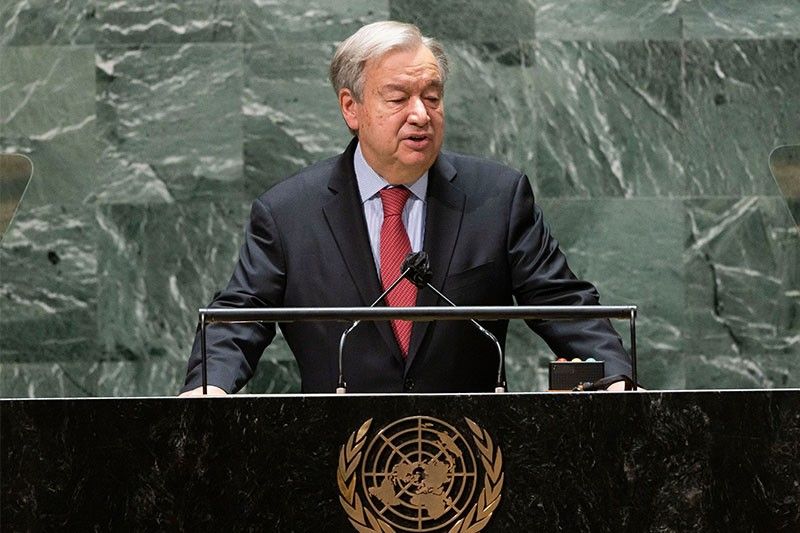UN chief 'very worried' over possible COP26 failure

PARIS, France — UN chief Antonio Guterres said Thursday that the current climate situation was "a one-way ticket for disaster" and stressed the need to "avoid a failure" at the COP26 climate conference in Glasgow.
The 2015 Paris Agreement on climate change, struck at the COP21 summit, called for capping global warming at well below 2C above the pre-industrial level, and ideally closer to 1.5C.
But current UN estimates indicate a "catastrophic" warming of 2.7C is on the cards.
Guterres said the present indications "show a pathway of at least 2,7C heating above pre industrial levels, and that’s obviously a one way ticket for disaster."
"The carbon pollution of a handful of countries has brought humanity to its knees and they bear the greatest responsability," he told an online press conference with members of the Covering Climate Now international project.
"I hope we are still on time to avoid a failure in Glasgow, but time is running short, and things are getting more difficult and that is why I’m very very worried. I’m afraid things might get wrong," he said.
"The G20 leaders will meet in Rome and they know their economies are responsible for four-fifth of planet carbon pollution," Guterres said.
"If they do not stand up ... we are headed for terrible human sufferings," he added.
He said: "China and the United States must do more than what they have announced so far."
Held between October 31 and November 12, the Glasgow gathering is seen as a crucial step in setting worldwide emission targets to slow global warming.
At current levels of greenhouse gas emissions, Earth could warm by 1.5 degrees Celsius (2.7 degrees Fahrenheit) as early as 2030, the Intergovernmental Panel for Climate Change says in a landmark report.
"Global warming is likely to reach 1.5C between 2030 and 2052 if it continues to increase at the current rate," the report concluded with "high confidence."
Earth's surface has warmed one degree Celsius (1.8 degrees Fahrenheit)—enough to lift oceans and unleash a crescendo of deadly storms, floods and droughts—and is on track toward an unliveable 3C or 4C rise.
Japan issued heatstroke alerts Sunday to tens of millions of people as near-record high temperatures scorched swathes of the country, while torrential rain pummelled other regions.
National broadcaster NHK warned viewers that the heat was at life-threatening levels, as temperatures soared to nearly 40 degrees Celsius (104 degrees Fahrenheit) in some places, including the capital Tokyo.
"Please stay hydrated and use air conditioners appropriately, and refrain from outings that seem difficult," a news presenter said. — AFP
Developing countries voice "disappointment" as climate talks in Germany ended Thursday with frustrations flaring over a lack of momentum on helping vulnerable nations cope with the impacts of warming.
With world attention drawn towards other challenges, notably Russia's invasion of Ukraine and spiralling food, energy and economic crises, the technical discussions meant to lay the groundwork for key United Nations negotiations later this year were mired in disagreements.
Representatives of nearly 200 countries arrived in the city of Bonn buoyed by the ambition displayed six months ago during the UN COP26 negotiations in Glasgow, where countries rallied around the urgent threat of climate change.
"After that sense of emergency had been established, probably the expectations were very high," says Preety Bhandari, senior climate adviser at the World Resources Institute. — AFP
Negotiators from almost 200 countries will meet in Bonn Monday for climate talks tasked with reigniting momentum on tackling global warming, as Russia's invasion of Ukraine overshadows the threat from rising emissions.
The conference will set the stage for a fresh round of major United Nations talks later this year in Egypt.
It will also be a chance to test the resolve of nations facing a catalogue of crises, including escalating climate impacts, geopolitical tensions, bloodshed in Ukraine and the threat of a devastating global food crisis.
"Climate change is not an agenda we can afford to push back on our global schedule," said outgoing UN climate change chief Patricia Espinosa ahead of the meeting. — AFP
Nations in the G20 group of major economies have yet to strengthen greenhouse gas reduction goals despite agreeing to revisit their plans ahead of critical UN climate talks in November, according to an analysis by leading research NGOs seen exclusively by AFP.
At the Glasgow COP26 climate summit last year countries pledged to review inadequate plans for cutting carbon pollution this decade ahead of the COP27 conference.
Two G20 nations — India and Turkey — have failed to update their original carbon cutting plans submitted in 2015, as required under the Paris Agreement.
Neither has non-G20 member Egypt, which will host the COP27 climate summit in November. — AFP
Four key climate change indicators all set new record highs in 2021, the United Nations said Wednesday, warning that the global energy system was driving humanity towards catastrophe.
Greenhouse gas concentrations, sea level rise, ocean heat and ocean acidification all set new records last year, the UN's World Meteorological Organization (WMO) said in its "State of the Global Climate in 2021" report.
"The global energy system is broken and bringing us ever closer to climate catastrophe," UN Secretary-General Antonio Guterres said of the findings. — AFP
- Latest
- Trending































